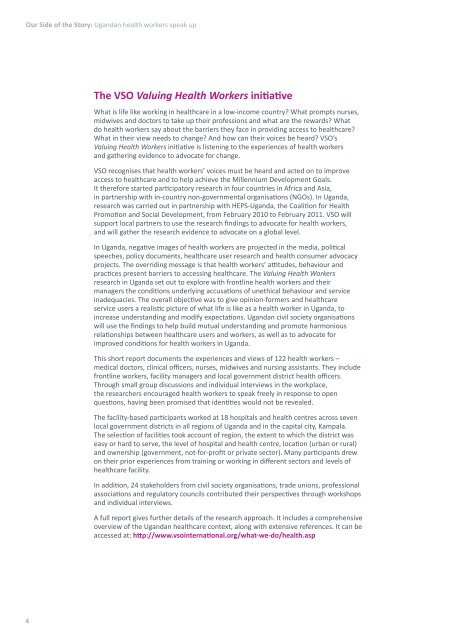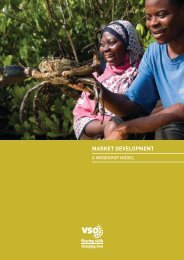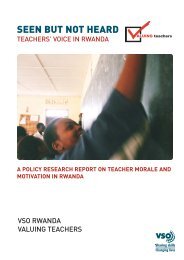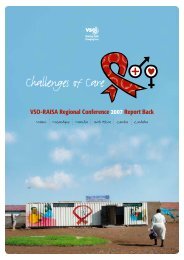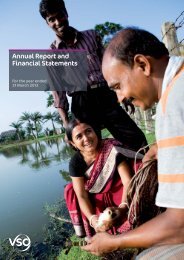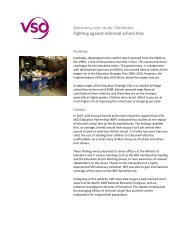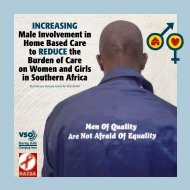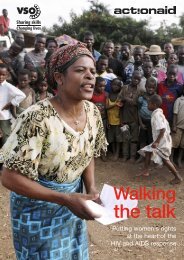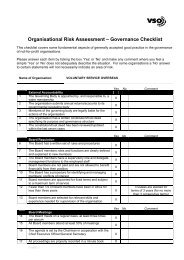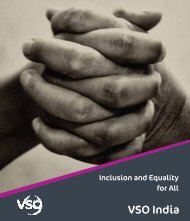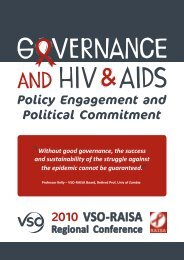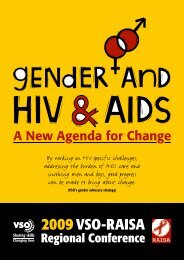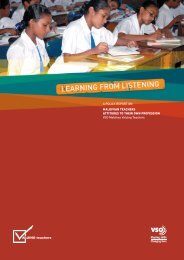Our Side of the Story - Ugandan health workers speak up - VSO
Our Side of the Story - Ugandan health workers speak up - VSO
Our Side of the Story - Ugandan health workers speak up - VSO
Create successful ePaper yourself
Turn your PDF publications into a flip-book with our unique Google optimized e-Paper software.
<strong>Our</strong> <strong>Side</strong> <strong>of</strong> <strong>the</strong> <strong>Story</strong>: <strong>Ugandan</strong> <strong>health</strong> <strong>workers</strong> <strong>speak</strong> <strong>up</strong><br />
The <strong>VSO</strong> Valuing Health Workers initiative<br />
What is life like working in <strong>health</strong>care in a low-income country What prompts nurses,<br />
midwives and doctors to take <strong>up</strong> <strong>the</strong>ir pr<strong>of</strong>essions and what are <strong>the</strong> rewards What<br />
do <strong>health</strong> <strong>workers</strong> say about <strong>the</strong> barriers <strong>the</strong>y face in providing access to <strong>health</strong>care<br />
What in <strong>the</strong>ir view needs to change And how can <strong>the</strong>ir voices be heard <strong>VSO</strong>’s<br />
Valuing Health Workers initiative is listening to <strong>the</strong> experiences <strong>of</strong> <strong>health</strong> <strong>workers</strong><br />
and ga<strong>the</strong>ring evidence to advocate for change.<br />
<strong>VSO</strong> recognises that <strong>health</strong> <strong>workers</strong>’ voices must be heard and acted on to improve<br />
access to <strong>health</strong>care and to help achieve <strong>the</strong> Millennium Development Goals.<br />
It <strong>the</strong>refore started participatory research in four countries in Africa and Asia,<br />
in partnership with in-country non-governmental organisations (NGOs). In Uganda,<br />
research was carried out in partnership with HEPS-Uganda, <strong>the</strong> Coalition for Health<br />
Promotion and Social Development, from February 2010 to February 2011. <strong>VSO</strong> will<br />
s<strong>up</strong>port local partners to use <strong>the</strong> research findings to advocate for <strong>health</strong> <strong>workers</strong>,<br />
and will ga<strong>the</strong>r <strong>the</strong> research evidence to advocate on a global level.<br />
In Uganda, negative images <strong>of</strong> <strong>health</strong> <strong>workers</strong> are projected in <strong>the</strong> media, political<br />
speeches, policy documents, <strong>health</strong>care user research and <strong>health</strong> consumer advocacy<br />
projects. The overriding message is that <strong>health</strong> <strong>workers</strong>’ attitudes, behaviour and<br />
practices present barriers to accessing <strong>health</strong>care. The Valuing Health Workers<br />
research in Uganda set out to explore with frontline <strong>health</strong> <strong>workers</strong> and <strong>the</strong>ir<br />
managers <strong>the</strong> conditions underlying accusations <strong>of</strong> unethical behaviour and service<br />
inadequacies. The overall objective was to give opinion-formers and <strong>health</strong>care<br />
service users a realistic picture <strong>of</strong> what life is like as a <strong>health</strong> worker in Uganda, to<br />
increase understanding and modify expectations. <strong>Ugandan</strong> civil society organisations<br />
will use <strong>the</strong> findings to help build mutual understanding and promote harmonious<br />
relationships between <strong>health</strong>care users and <strong>workers</strong>, as well as to advocate for<br />
improved conditions for <strong>health</strong> <strong>workers</strong> in Uganda.<br />
This short report documents <strong>the</strong> experiences and views <strong>of</strong> 122 <strong>health</strong> <strong>workers</strong> –<br />
medical doctors, clinical <strong>of</strong>ficers, nurses, midwives and nursing assistants. They include<br />
frontline <strong>workers</strong>, facility managers and local government district <strong>health</strong> <strong>of</strong>ficers.<br />
Through small gro<strong>up</strong> discussions and individual interviews in <strong>the</strong> workplace,<br />
<strong>the</strong> researchers encouraged <strong>health</strong> <strong>workers</strong> to <strong>speak</strong> freely in response to open<br />
questions, having been promised that identities would not be revealed.<br />
The facility-based participants worked at 18 hospitals and <strong>health</strong> centres across seven<br />
local government districts in all regions <strong>of</strong> Uganda and in <strong>the</strong> capital city, Kampala.<br />
The selection <strong>of</strong> facilities took account <strong>of</strong> region, <strong>the</strong> extent to which <strong>the</strong> district was<br />
easy or hard to serve, <strong>the</strong> level <strong>of</strong> hospital and <strong>health</strong> centre, location (urban or rural)<br />
and ownership (government, not-for-pr<strong>of</strong>it or private sector). Many participants drew<br />
on <strong>the</strong>ir prior experiences from training or working in different sectors and levels <strong>of</strong><br />
<strong>health</strong>care facility.<br />
In addition, 24 stakeholders from civil society organisations, trade unions, pr<strong>of</strong>essional<br />
associations and regulatory councils contributed <strong>the</strong>ir perspectives through workshops<br />
and individual interviews.<br />
A full report gives fur<strong>the</strong>r details <strong>of</strong> <strong>the</strong> research approach. It includes a comprehensive<br />
overview <strong>of</strong> <strong>the</strong> <strong>Ugandan</strong> <strong>health</strong>care context, along with extensive references. It can be<br />
accessed at: http://www.vsointernational.org/what-we-do/<strong>health</strong>.asp<br />
4


